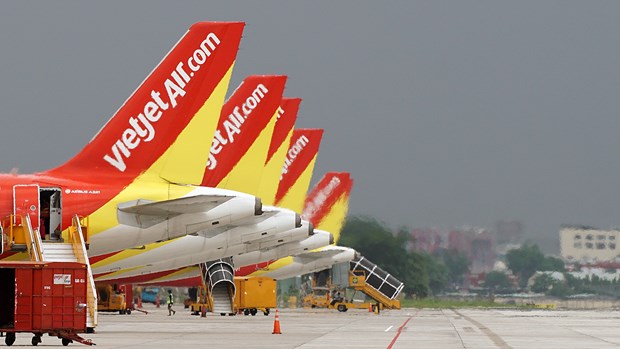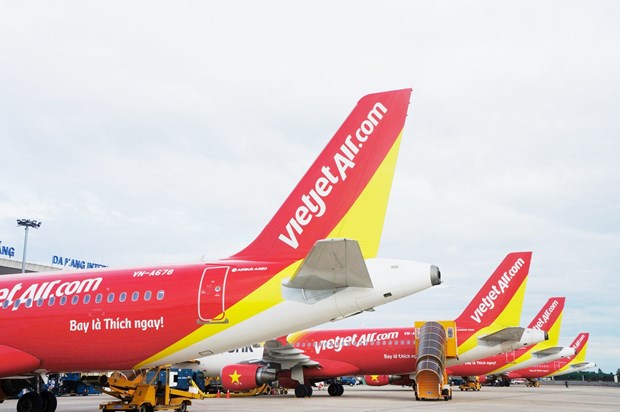Finding opportunities in risk: transport sector restructuring
To mitigate losses caused by COVID-19, besides tightening their belts, businesses have also mapped out other solutions.
Hanoi (VNA) – To mitigate losses caused by COVID-19, besides tightening their belts, businesses have also mapped out other solutions.
Proactively designing response scenarios
Aware of the widespread and severe impacts of the COVID-19 pandemic on business, the Airports Corporation of Vietnam (ACV) has adjusted its business plan, according to Chairman of the Board of Directors of ACV LaI Xuan Thanh. He said ACV decided to coordinate with airlines to seek new markets and find opportunities in risks, in the spirit of the Prime Minister’s instruction.
Citing the lesson learnt during the period of the SARS epidemic when airlines fell into big difficulties due to their over-dependence on the Chinese market, the ACV Chairman said after that, the aviation industry has restructured its markets to avoid depending on a certain market.
“Airlines need to shift attention to other markets, while airports like Noi Bai and Tan Son Nhat will receive more flights by other airlines instead of Chinese ones to mitigate the negative effect of COVID-19,” according to Thanh.
 The COVID-19 pandemic is a test to transport businesses in finding opportunities in risks
The COVID-19 pandemic is a test to transport businesses in finding opportunities in risks Director of the Civil Aviation Authority of Vietnam (CAAV) Dinh Viet Thang added that restructuring markets needs time, particularly in the context of the world, regional and domestic aviation markets all affected by the pandemic.
CEO of Vietnam Airlines Duong Chi Thanh said that the top target of the carrier now is not profit but the flow of money in order to survive in the current situation. He informed that senior executives in the Board of Directors and of the carriers will have their salary cut by 40 percent, those at lower levels will receive 30 percent and 20 percent less salary, while employees at the lowest rank will take turn to work towards salary cut in the future.
The Vietnam Airlines leader also said the carrier will look for measures to cut costs and maximize operation efficiency to cope with the pandemic’s impact.
[What scenario for transport sector to survive in COVID-19 pandemic]
For land transport, Chairman of the Dat Cang Transport, Trade and Services Joint Stock Company Khuc Huu Thanh Hai said the company is considering cutting back on operation and personnel to compensate on losses.
To cope with difficulties, transport enterprises proposed that competent agencies assist them with epidemic prevention work (particularly infection prevention for drivers and passengers); seeking new partners and market; controlling bad rumours that can affect passengers’ psychology; combining transport in investment stimulus measures of other sectors; further improving investment environment and reforming administrative procedures to facilitate investment in transport.
Admitted that the railway sector cannot compete with aviation in terms of fare and time for long-distance travel, Vu Anh Minh of Vietnam Railway (VNR) said the sector will focus on short and medium distance travel in which it holds an advantage.
VNR will increase cargo transport to compensate for the drop in passengers, and open more container services on the North-South route.
“It is time to restructure our operation towards more cargo transport to increase transport volume, revenue and business efficiency,” Minh said.
Proposing policy to rescue transport
To support Vietnamese airlines amid the COVID-19 storm, the CAAV has asked the Transport Ministry to propose to the Government support measures in the form of cutting service fees.
The suggested measures include a reduction of 50 percent for take-off and landing fees, and flight control service fees for domestic flights during the period from March 1 to May 31; application of the minimum zero VND fee for specialized aviation services in the list of services subject to State price control; and allowing service suppliers to reduce service fees for airlines and other service users.
 The CAAV proposes reduction and exemption of import tax and environment tax on jet fuel for three months.
The CAAV proposes reduction and exemption of import tax and environment tax on jet fuel for three months. The CAAV also proposed reduction and exemption of import tax and environment tax on jet fuel for three months, which it said would help ease the burden on airlines and help them remain in business.
In case the State budget meets difficulties, the CAAV suggested reducing by half import tax and environment tax on jet fuel, and allowing businesses to postpone the payment of tax and other contributions to the budget.
Meanwhile, the Directorate for Roads proposed support measures such as reducing loan interest rates, rescheduling payment deadline for bank loans, postponing the payment of social and unemployment insurance premiums. Transport companies also asked for permission to cut down on operation.
Do Xuan Hoa, Vice Chairman and Secretary General of the Vietnam Automobile Transport Association (VATA), said transport companies are still waiting for support from competent agencies.
According to Hoa, the association has submitted to the Prime Minister a proposal on such support measures as credit packages, a 50 percent reduction in VAT and corporate income tax, reduction in land tax, among others.
VATA asked the Ministry of Labour, Invalids and Social Affairs to postpone the payment of social insurance debt, the Transport Ministry and Finance Ministry to reduce road maintenance and BOT fees.
Transport Minister Nguyen Van The said the proposed reduction of interest rate, taxes and fees, or rescheduling of debt or social insurance premium payment would greatly affect State budget collection. Therefore, the Transport Ministry will have to study them carefully before reporting to the Government and the National Assembly to make decision./.
 Rescheduling is expected to re-vitalise the transport sector (Photo: VietnamPlus)
Rescheduling is expected to re-vitalise the transport sector (Photo: VietnamPlus)












